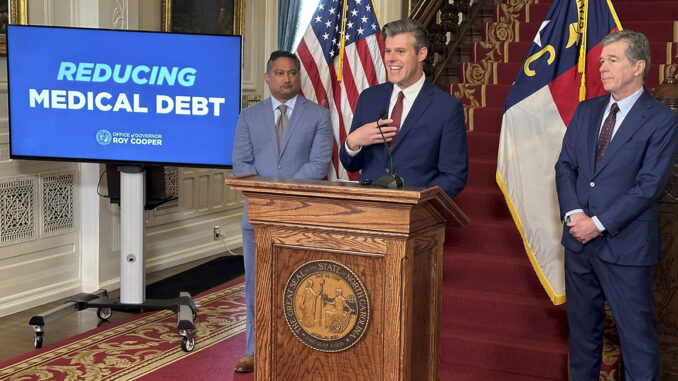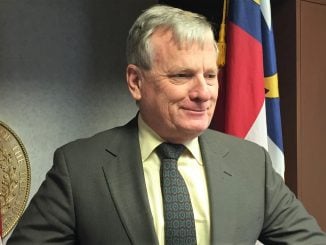
RALEIGH —The North Carolina state government seek to eliminate potentially billions in medical debt from low- and middle-income residents by offering a financial incentive for hospitals to pay off unpaid bills and implement policies supporting future patients.
Democratic Gov. Roy Cooper and his health chief unveiled a plan Monday that they want federal Medicaid regulators to approve soon. The plan would allow roughly 100 hospitals that recently began receiving enhanced federal Medicaid reimbursement funds to receive even more money.
But to qualify, an acute-care, rural or university-connected hospital would have to voluntarily do away with patients’ medical debt going back to early 2014 on current Medicaid enrollees — and on nonenrollees who make below certain incomes or whose debt exceeds 5% of their annual income.
These hospitals also would have to help low- and middle-income patients — for example, those in a family of four making no more than $93,600 — by providing deep discounts on medical bills incurred. The hospitals would have to enroll people automatically in charity care programs, agree not to sell their debt to collectors or tell credit reporting agencies about unpaid bills. Interest rates on medical debt also would be capped.
“It’s clear that by providing relief for medical debt, we give North Carolinians not just peace of mind, but truly a fresh start,” state Health and Human Services Secretary Kody Kinsley said at a news conference.
Other state and local governments have tapped into federal American Rescue Plan funds to help purchase and cancel residents’ debt for pennies on the dollar. Kinsley said North Carolina’s proposed initiative would be different in creating a long-term debt solution.
North Carolina legislators last year created enhanced Medicaid reimbursement payments for hospitals — called the Healthcare Access and Stabilization Program — alongside provisions that expanded Medicaid coverage in the state to working adults who couldn’t otherwise qualify for conventional Medicaid. Almost 500,000 people have enrolled since last December.
“Large judgments remain on the books that prevent people from buying a house or getting a credit card,” Cooper said. “The weight of medical debt still casts a long shadow. So first we expanded Medicaid, and now we must reduce medical debt to help North Carolinians and our economy thrive.”
The proposal, which Kinsley said was a first of its kind, doesn’t require a new state law and won’t cost the state any additional funds. The U.S. Centers for Medicare and Medicaid Services must approve the Healthcare Access and Stabilization Program changes sought last week. Kinsley said in an earlier interview that he believes regulators will be “aggressive in their approval.”
The financial possibilities for hospitals in debt programs that agree to debt alterations are rich enough to sweeten the deal. The state Department of Health and Human Services said hospitals participating would be eligible to share funds from a pot of up to $6.5 billion next year. Those who don’t can share $3.2 billion.
According to state DHHS, the debt relief wouldn’t begin immediately, but consumers would benefit in 2025 and 2026.
The effort also depends on the willingness of the state’s hospitals to participate. The North Carolina Healthcare Association — which lobbies for nonprofit and for-profit hospitals — said later Monday that the group and its members need more time to review the proposal.
“North Carolina hospitals and health systems are committed to the care and well-being of all North Carolinians, and we recognize that medical debt is a concern for many,” the association said in a news release, citing hospital efforts for “providing safe, high-quality care to all, regardless of their ability to pay.”
Republican State Treasurer Dale Folwell has questioned the commitment of the state’s largest nonprofit hospital systems to treating poor patients at free or reduced rates.
Representatives of patient advocacy groups at the news conference praised Cooper’s effort. The proposal gives “patients the ability to focus on what’s most important, which is their health, instead of worrying about when the debt collector is going to call again and demand payment,” Dave Almeida with the Leukemia & Lymphoma Society said.
DHHS said a group called Undue Medical Debt, which has assisted other governments with buying medical debt and erasing it, would also work on the plan.


